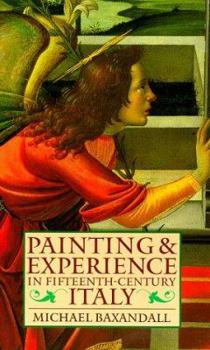Painting and Experience in Fifteenth-Century Italy: A Primer in the Social History of Pictorial Style
Select Format
Select Condition 
Book Overview
Serving as both an introduction to fifteenth-century Italian painting and as a text on how to interpret social history from the style of pictures in a given historical period, this new edition to Baxandall's pre-eminent scholarly volume examines early Renaissance painting, and explains how the style of painting in any society reflects the visual skills and habits that evolve out of daily life. Renaissance painting, for example, mirrors the experience...
Format:Paperback
Language:English
ISBN:019282144X
ISBN13:9780192821447
Release Date:July 1988
Publisher:Oxford University Press
Length:200 Pages
Weight:0.61 lbs.
Dimensions:0.2" x 5.4" x 8.1"
Customer Reviews
3 ratings
Art Book
Published by Thriftbooks.com User , 16 years ago
This was my first introduction to the art historian world and it was fascinating. Unfortunately, but only for me, is the fact that both my educational level and acquired knowledge of the subject were insufficiently advanced to fully appreciate the author's insights. That just calls for more work on my part to study up in advance. It should be taken as praise for Mr. Baxandall's pedagocic style which -- as the best teachers tend to do -- opened up new vistas, if only I choose to look. My only crticism is not of the contents or the author but of the publisher or more likely the editor. Perhaps it is pure economics which resulted in this insecure form of binding and too much type on each page to save space, while the juxtaposition of plates against the relevant text reference was very poor.
A Must-Read If You Are More Than A Casual Art Student
Published by Thriftbooks.com User , 19 years ago
I really can't add more to Robert W. Moore's insightful review. However, I feel a need to counterbalance the ranting reviews posted by others on this page. In particular, the one-star reviews listed here are simply embarrassing. Clearly, these reviewers do not represent the intended audience for this book. It's not Michael Baxandall's fault that these reviewers were unable or unwilling to engage themselves with the depth, detail, and scope of his book. Ignore them. Here's a useful litmus test: If you would consider taking an art history course because you think it would be an "easy A," avoid this book. On the other hand, if you hold a genuine interest and enthusiasm for art history in general - and for Renaissance art in particular - this book should be well worth your time.
A classic study of the vocabulary of Renaissance painting
Published by Thriftbooks.com User , 23 years ago
I find it strange that many people find it strange that one might read a book like this one for fun. Twice in one day I had people approach me and ask me for what class I was reading this, as if there are books one reads only in school and books one reads in real life.I did read this in real life, and I read it for three reasons: 1) I knew this is a highly regarded book in art criticism, 2) it deals with a period of art history about which I wanted to know more, and 3) it looked like it would be a fun read. My primary reaction to the book upon reading it was: how did the author fit such a huge book into so few pages? There are books that cannot be measured by page count. PAINTING AND EXPERIENCE IN FIFTEENTH-CENTURY ITALY contains 153 pages of text, with illustrations taking up around a third of those. Despite that, Baxandall is able to pack an amazing amount of information in a very small number of pages. Yet, as dense as this book is, it never becomes anything less than completely readable. It is a very fast read, and not merely because of the small number of pages. Baxandall's contention is that the visual experience of a Quattrocento person (or what he eventually comes to self-mockingly comes to call "a church-going business man, with a taste for dancing") is not one to which we any longer have conceptual access. He laments that we too often approach these paintings with our own conceptual categories in the forefront, and impose these upon the paintings, instead of judging them and perceiving them, as a contemporary would have. His goal in this slender volume is to attempt to reestablish some sense of the pictorial concepts with which a Quattrocento person approaches a painting. In this I believe he succeeds admirably. While visiting one of my local book superstores, I spent some time glancing through a number of books on Renaissance art, especially Hartt's well-known tome. I found that I was indeed responding differently to the paintings than I had before I read Baxandall. This is a book that capacitates its reader to enjoy a fuller participation in the appreciation of the visual world.On a completely nonliterary note, I want to add that this is an extraordinarily attractive book. I am sure that no publisher ever decides to make an ugly, unpleasant book, but Oxford University Press with this one certainly managed to make a gorgeous one. The book is far more attractive than the price of the book would seem to support (good paper, pseudo-signature binding, high-quality four-color cover), which leads me to believe that this must get a great deal of adoption as a college text.






